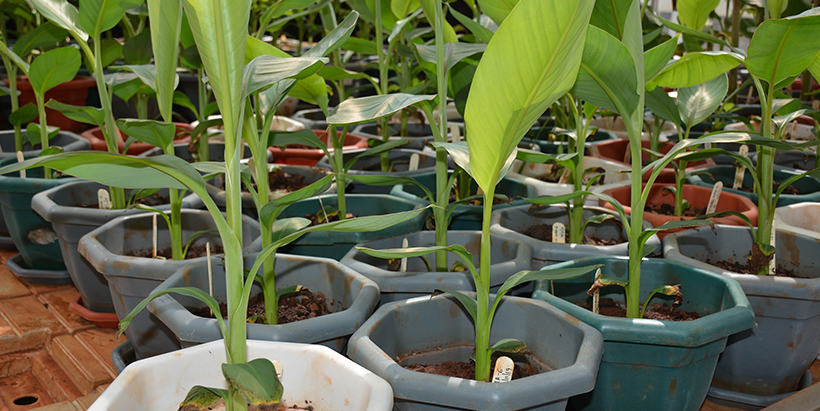1 June 2022
by Gloriana Ndibalema
Climate change affects the environment extensively in socioeconomic and related sectors, including agriculture and food and nutritional security for the growing global population. To address this urgent need, Africa needs to adopt sustainable intensification of agriculture to close the yield gap in staple crops, where tools, including biotechnology and traditional approaches, are recommended for crop improvement.
 Gene edited banana in a greenhouse. Photo credit: Jaindra Tripathi/IITA
Gene edited banana in a greenhouse. Photo credit: Jaindra Tripathi/IITA
The recent study titled “Genome Editing for Sustainable Agriculture in Africa” published in the journal Frontiers in Genome Editing revealed the need and efficiency of exploring genome editing as an addition to conventional technologies for developing improved crop varieties.
The study noted that CRISPR-based genome editing has rapidly become the most prevalent genetic engineering approach for developing improved crop varieties because of its simplicity, efficiency, specificity, and ease of use. Genome editing technologies allow targeted manipulation of the plant genomes, accelerating breeding efforts to develop improved crop varieties. It can also reduce inputs such as fertilizers and pesticides, increase yields, improve nutrition, and develop climate-resilient crops.
The study, led by Leena Tripathi, Research Director at the IITA, with her team, Valentine Ntui, Easter Syombua, Samwel Muiruri, and Jaindra N. Tripathi, in collaboration with Kanwarpal Dhugga and Zhengyu Wen from the International Maize and Wheat Improvement Center (CIMMYT), Mexico and Steven Runo from the Kenyatta University, Kenya, explores the recent advances and progress in the CRISPR/Cas9-based genome editing efforts with major staple food crops grown in several countries in Africa.
The researchers in Africa use genome editing tools to improve African staple crops for biotic and abiotic stress resistance and improved nutritional quality. The crops under development include disease-resistant banana, maize resistant to lethal necrosis, and sorghum resistant to the parasitic plant Striga and enhanced quality for African farmers.
“The genome-editing tool is one of the powerful technologies available in the crop improvement toolbox, which can be used along with other tools for improving agriculture to feed the world’s rapidly growing population. It can develop improved crop varieties with no foreign gene integration like those created through conventional breeding,” explained Tripathi. She added that genome-edited products are not regulated as GMOs in several countries, including two countries in Africa: Kenya and Nigeria.
Tripathi also added that although many researchers are exploring the potential of genome editing in developing crop varieties for better and more sustainable African agriculture, there is a need for adequate funding and enabling policies to release genome editing products.
As the global landscape of regulatory developments for genome-edited crops is quickly changing, the future looks bright for African agriculture. The continent is progressing in creating the enabling environment for commercializing genome-edited crop varieties by countries having clear genome-editing regulatory frameworks and biosafety guidelines.